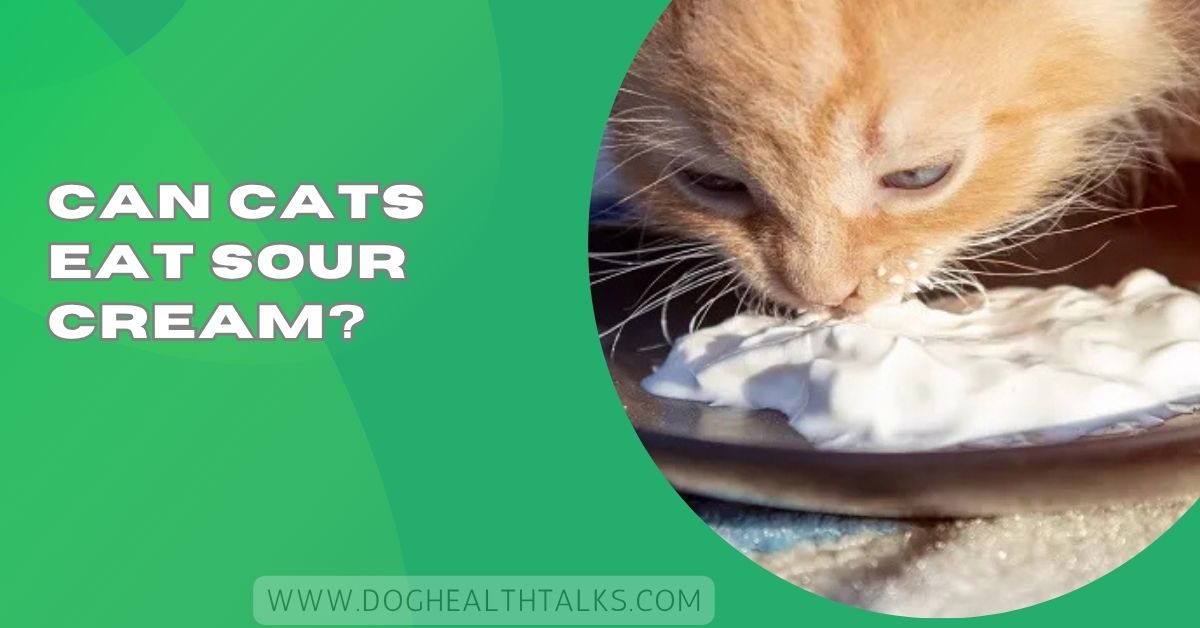Can Cats Eat Sour Cream? – Expert Advice for Pet Parents!
Cats are curious about our foods—especially when something creamy or rich appears on the table. If you’ve ever wondered whether your feline friend can safely sample a bit of sour cream, you’re not alone.
Cats can eat sour cream in very small amounts. It’s non-toxic but not recommended. Too much may upset their stomach, so offer only a tiny taste occasionally and avoid flavored or seasoned varieties.
In this article we’ll look at what sour cream actually is, how it fits (or doesn’t) into a cat’s diet, what risks are involved, how much (if any) to give, and some safer alternatives.
What is sour cream?
Sour cream is a dairy product made by fermenting cream with cultures of lactic acid bacteria. The result: a thick, tangy-cream topping commonly used on baked potatoes, tacos, dip platters, and more.
Because it’s derived from dairy, it contains lactose (the sugar in milk), fats, proteins, and often additional stabilizers or thickeners depending on the brand.
While human-appropriate, this food is not formulated for cats, whose digestive systems and nutritional needs are quite different.
The biology: cats and dairy
To understand whether sour cream is suitable for cats, it helps to look at feline biology. Cats are obligate carnivores, meaning their bodies are designed to thrive on meat—animal proteins, fats, and certain nutrients found almost exclusively in animal tissue. Their diets naturally rely less on carbohydrates and dairy-based foods.
One major factor: lactose intolerance. Many adult cats produce less lactase (the enzyme needed to digest lactose) after they’re weaned from their mother’s milk.
As a result, dairy products can lead to digestive upset. According to expert sources, most adult cats are lactose intolerant or at least less tolerant than kittens.
Because sour cream is dairy, contains lactose and fat, and offers minimal nutritional benefit for cats, it becomes a food to approach with caution.
Is sour cream safe for cats?
Yes, in the sense that sour cream is not toxic to cats. For most healthy cats, a very small taste probably won’t result in serious harm.
For example, one veterinary-reviewed article explains that “[sour cream] isn’t toxic or poisonous for cats. … Your cat won’t face serious medical harm from eating a little bit of sour cream…”
However—that “little bit” and “won’t face serious harm” don’t translate into “it’s fine to feed regularly” or “it’s beneficial for cats.” The consensus is: it’s possible to feed, but not recommended except as an occasional treat (if at all).
When is it not safe?
Several circumstances make sour cream more risky or simply inappropriate for cats:
- Flavoured or seasoned varieties: Many sour creams and sour-cream-based dips include garlic, onion, chives, spices or other additives. Onions and garlic (and related alliums) are toxic to cats.
- Large amounts or frequent feeding: Feeding too much or too often adds excess fat & calories, which may lead to digestive issues, obesity, pancreatitis, or other health problems.
- Cats with digestive sensitivities or health issues: If your cat is overweight, has pancreatitis, a sensitive stomach, or certain metabolic conditions, then even a small amount might cause trouble.
- Poorly stored or spoiled dairy: Like any dairy product, sour cream can harbor bacterial growth if left out or past its expiration—potentially harmful to any pet.
In short: flavored versions (especially dips), generous portions, or repeated servings increase the risk significantly.
How much sour cream can a cat have?
Because sour cream brings minimal nutritional benefit to a cat, the feeding guideline is very modest.
A reliable reference recommends “never feeding your cat more than a teaspoon of sour cream at a time” and only doing so very rarely.
A practical approach: If you decide to share sour cream, use a plain, unsweetened version, give no more than half a teaspoon (or a lick) occasionally, and monitor your cat afterward. It’s purely a treat, not a dietary staple.
What could happen if your cat eats sour cream?
Worst-case scenario: If a cat with strong lactose intolerance eats a larger amount of sour cream, you might see symptoms such as:
- Diarrhea or loose stools
- Vomiting
- Gas or bloating
- Abdominal discomfort or restlessness
- Over time, if fatty foods are frequent: weight gain, obesity, even pancreatitis (inflammation of the pancreas)
What to do if your cat sneaks some sour cream: Most likely, if it’s a small amount, your cat will be fine—but keep an eye on them. As one vet‐-answered question puts it: “It’s unlikely to cause serious problems, but you should monitor for vomiting or diarrhea.”
If symptoms persist >24 hours, or your cat seems very unwell, contact your veterinarian.
Are there any benefits of sour cream for cats?
Not really—or at least, not enough to justify feeding it. Sour cream contains a small amount of protein, calcium, and some vitamins, but not in forms or quantities that are meaningful for cats. As one article states: “the small amount [of protein] in sour cream isn’t sufficient to really help your cat.”
In short: it provides novelty, perhaps texture, but very little nutritional value compared with a proper cat food.
Should you give it at all?
Given the risks + minimal benefits, many veterinarians and pet nutrition experts recommend simply not offering sour cream. Some phrasing from reliable sources:
- “Not recommended” as part of a cat’s diet.
- “Safe in very small amounts, but not ideal.”
If you decide to give your cat a lick of sour cream:
- Ensure it is plain, unseasoned, unsweetened.
- Give only a very small taste (e.g., half a teaspoon or less).
- Don’t make it a regular treat.
- Monitor for any digestive or behavioural change.
- Consider lactose-free or cat-specific dairy treats if you are intent on giving dairy.
Safer alternatives for treats
If you like treating your cat, consider healthier, more cat-appropriate options:
- Small pieces of cooked, plain meat (chicken, turkey, fish) without seasoning.
- Cat-specific dairy treats or small amounts of lactose-free yogurt made for pets.
- Commercial cat treats formulated to meet feline nutritional needs.
- Cat-safe vegetables or herbs (sparingly) if your cat tolerates them and you want to vary texture.
These options align better with a cat’s diet and avoid the problems associated with plain sour cream.
Can Cats Eat Sour Cream And Onion Chips
No, cats should never eat sour cream and onion chips. They contain onion, salt, and seasoning that are toxic to cats and can cause vomiting, weakness, or serious health problems.
Can Cats Eat Sour Cream Everyday
No, cats shouldn’t eat sour cream daily. Even though it’s not poisonous, it’s too fatty and hard to digest. Giving it every day can upset their stomach and cause weight gain.
Can Cats Eat Sour Cream Powder
It’s best not to give cats sour cream powder. It usually contains artificial flavors, salt, and additives that can harm your cat’s digestive system or lead to dehydration and stomach discomfort.
Can Cats Eat Sour Cream And Chive Dip
No, cats can’t eat sour cream and chive dip. Chives are toxic to cats, and the dip often includes garlic, onion, and salt, which can all cause serious health problems if eaten.
Can Dogs Eat Sour Cream
Yes, dogs can eat plain sour cream in small amounts. It’s not toxic, but some dogs are lactose intolerant. Too much can cause diarrhea or stomach upset, so moderation is important.
Can Cats Eat Guacamole
No, cats should never eat guacamole. It often contains onion, garlic, lime, and avocado, which can be toxic to cats. Even small amounts may cause vomiting or other serious health issues.
Can Cats Eat Whipped Cream
Cats can have a tiny lick of plain whipped cream, but it’s not healthy. It’s sugary, fatty, and hard to digest, which can upset their stomach or cause weight gain over time.
FAQ
What happens when cats eat sour cream?
Most cats may get an upset stomach or diarrhea because they can’t digest lactose found in sour cream easily.
What is the silent killer of cats?
Kidney disease is often called the silent killer of cats because it develops slowly and shows few early symptoms.
Can cats have a taste of sour cream?
Yes, cats can have a tiny lick of plain sour cream, but too much can cause stomach upset or diarrhea.
Can cats lick sour cream and onion chips?
No, cats shouldn’t lick sour cream and onion chips. Onions and seasonings are toxic and can harm their red blood cells.
How do cats say “I’m sorry”?
Cats show they’re sorry by rubbing against you, blinking slowly, or curling up close to regain your love and trust.
Why can’t cats have yogurt?
Most cats can’t handle yogurt because it contains lactose. It can cause stomach pain, gas, or diarrhea in adult cats.
What is the 3-3-3 rule for cats?
The 3-3-3 rule means three days to adjust, three weeks to feel comfortable, and three months to fully settle.
What is a silent killer disease in cats?
Chronic kidney disease is a silent killer in cats since it progresses quietly and signs often appear too late for treatment.
What is the most toxic thing to a cat?
Onions, garlic, chocolate, and antifreeze are highly toxic to cats and can cause severe poisoning or even death if eaten.
Final thoughts
You love your cat, and you want to share enjoyment—but the reality is, just because a food is safe in small amounts doesn’t mean it’s wise to make a habit of it. Sour cream falls into that category. For most cats, a tiny lick won’t cause damage—but neither will it provide meaningful nutrition. It introduces risk (digestive upset, obesity, fat load) and offers little reward.
If your cat shows interest in sour cream, you might let them have the tiniest taste once in a blue moon—but keep in mind their diet should centre around high-quality cat food, and treats should be truly occasional. Avoid flavored dips, large portions, or frequent servings. Choose alternatives that are designed for cats. And of course, if your pet has health issues or dietary sensitivities, always check with your veterinarian.
In summary: Yes—cats can eat sour cream in very small amounts. But No—it should not become a regular treat or part of their diet. Keep their long-term health in mind and save the sour cream for your snack, not theirs.






